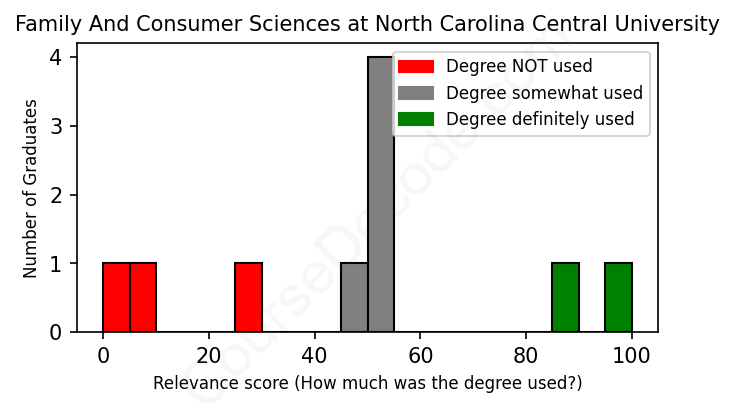
First, some facts. Of the Family And Consumer Sciences graduates from North Carolina Central University we've analyzed , here's how many have used (or NOT used) their degree in their career:

These are estimates based on AI analysis of 10 LinkedIn profiles (see below).
The verdict? Bad. Overall, with an average relevance score of 46%, Family And Consumer Sciences graduates from North Carolina Central University have a substantially lower likelihood (-21%) of finding work in this field compared to the average graduate across all fields:
And for comparison, here's the chart for all profiles we've looked at across all degrees.
Also, after graduating, 50% of these graduates have pursued further education other than another Bachelor's degree (such as a Masters degree or other), compared to the average across all profiles of 35%. This suggests you may need more than just a Bachelors degree to be competitive as a Family And Consumer Sciences graduate.
See the details:
|
Relevance score: 50% We think this person has gone into a career only somewhat relevant to their degree. We think this person has gone into a career only somewhat relevant to their degree.
DEGREE INFOGraduated in 2016 from North Carolina Central University with a Bachelor of Fine Arts - BFA in Family And Consumer Sciences. Also pursued further education since (see below). JOB HISTORY SINCE GRADUATIONHuman Resources Specialist Gaston County Government Sep 2022 - Present FURTHER DEGREES DONE SINCE GRADUATINGCertficationCentral Piedmont Community College 2022 - 2022 ABOUTNo information provided. |
The top 10 most common jobs done by the graduates we've analyzed (ranked most common to least) are:
When looking at jobs held by people who graduated with a degree in Family and Consumer Sciences from North Carolina Central University, it's clear that many end up in roles that don’t directly tie back to their studies. A lot of the positions listed seem to be in customer service, sales, and administrative roles, such as baristas, retail consultants, and project coordinators. While these jobs might use some soft skills like communication and interpersonal abilities that they likely learned during their education, they don't make full use of the specialized knowledge gained through their Family and Consumer Sciences degree.
However, there are a few standout positions that clearly align more closely with the degree, such as the Exceptional Children Teacher Assistant and Mental Health Technician roles. These jobs draw directly on the skills taught in Family and Consumer Sciences, focusing on human behavior and family dynamics. Overall, while graduates do find diverse job opportunities, the majority of positions seem to only partially utilize or completely miss the core competencies expected of a Family and Consumer Sciences education. It’s a bit disappointing, but it certainly highlights the versatility of the degree, even if it doesn't always lead to a perfect job fit.
Here is a visual representation of the most common words in job titles for Family And Consumer Sciences graduates (this is across all Family And Consumer Sciences graduates we've analyzed, not just those who went to North Carolina Central University):

From what I can see, graduates from North Carolina Central University who've studied Family and Consumer Sciences seem to have a pretty diverse set of career paths. Right after graduating, many land jobs that involve customer service, sales, or health-related roles. For example, job titles like Patient Service Associate and Certified Nursing Assistant pop up quite a bit as early entry-level positions. It seems like these roles often serve as stepping stones into more specialized or managerial positions, especially in healthcare and business sectors, like financial services and human resources.
Looking five to ten years into their careers, some graduates have moved into roles that take advantage of their degrees, like project coordination and management positions. While others have kind of drifted into areas that aren't directly related to Family and Consumer Sciences, such as retail or administrative roles. There’s a mix of success stories, but it looks like a fair number of grads are finding their way into jobs that leverage their education, particularly in healthcare or service industries. Overall, it seems there’s potential for growth and finding meaningful careers, but like any field, some people might just end up in jobs that don’t really align with what they studied.
Honestly, a Bachelor’s degree in Family and Consumer Sciences is generally considered to be on the easier side compared to some other majors, mainly because it focuses on practical, everyday topics like nutrition, family dynamics, and financial planning. At North Carolina Central University, you’ll find that the coursework is pretty approachable and designed to be hands-on and relevant to real-life situations. There will be some challenging assignments and projects, of course, but if you're interested in the subject matter and stay organized, it’s definitely manageable. Just don’t expect too much heavy math or science like you might find in engineering or hard sciences! Overall, if you're someone who enjoys learning about family and community well-being, you should find it a rewarding experience.
Most commonly, in the LinkedIn profiles we've looked at, it takes people 4 years to finish a Bachelor degree in Family And Consumer Sciences.
Looking at these Family and Consumer Sciences grads from North Carolina Central University, it seems like they've had a real mix of job experiences and earnings potential. Some, like the financial professionals at Duke University Health System, likely raked in decent salaries given the nature of their roles. On the flip side, folks working as baristas, retail clerks, or in entry-level positions seem to be on the lower end of the pay scale. It’s clear there’s a wide gap in earnings depending on the field and level of experience, which is pretty common in this line of work. So, overall, while some may be doing well, others are probably just scraping by, showing how varied this career path can be!
Here is a visual representation of the most common words seen in the "about" section of LinkedIn profiles who have a Bachelor degree in Family And Consumer Sciences (this is across all Family And Consumer Sciences graduates we've analyzed, not just those who went to North Carolina Central University). This may or may not be useful:

Here are all colleges offering a Bachelor degree in Family And Consumer Sciences (ordered by the average relevance score of their Family And Consumer Sciences graduates, best to worst) where we have analyzed at least 10 of their graduates:
| College | Score | Count |
|---|---|---|
 Texas State University Texas State University
|
64 | 12 |
 North Carolina Central University North Carolina Central University
|
46 | 10 |